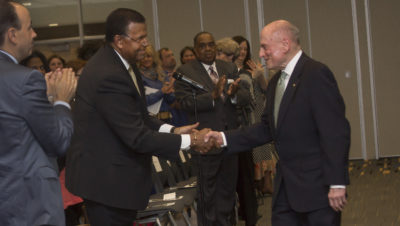Gloria Ladson-Billings urges connections with technology, hip-hop culture at Urban Education and Community Forum
Gloria Ladson-Billings has two sources of immense energy and power that she wants urban educators to tap as a means of helping their students succeed.
Smartphones and hip-hop culture.
Traditionalists are often aghast at the thought. But Ladson-Billings, the Kellner Family Distinguished Chair in Urban Education at the Department of Curriculum & Instruction at the University of Wisconsin-Madison, made a convincing case for her point of view. She was the keynote speaker at the seventh annual Urban Education and Community Forum April 5, sponsored by the School of Education at the University of Missouri-Kansas City.
Hip-hop culture provides an anchor, and a means of expression, for young people in an uncertain world, said Ladson-Billings. She holds a doctorate from Stanford and is a prolific author who has received numerous awards for her lifelong work, including The Dreamkeepers: Successful Teachers of African American Children.
A high school diploma, or even a college degree, is no longer the guarantee of lifelong employment it once was for people, no matter how talented and hard-working they are, she said.
“Hip-hop provides a hope for engaging students in a culturally relevant way,” she said. “We want our children to understand that the reason they should seek an education is larger than getting a good job. We also want them to be empowered to make good decisions,” from the workplace to their social lives to the voting booth.
She added that schools need to tap and channel the power of personal technology like smartphones, not suppress it.
“These young people are the most technologically astute, plugged-in generation the world has ever seen,” she said. But too often, schools order students to turn off their smartphones in class. “I want to scream, ‘It’s not a phone, it’s a computer,’ “ she said – one with far more power than the massive desktops in use when most teachers were in high school.
One of the consequences of the pervasiveness of both hip-hop culture and personal technology, she said, is that today’s students have very different conceptions of copyright, intellectual property and plagiarism rules. Borrowing and “sampling” from other sources is commonplace and not seen as any big deal.
“I’m not saying we have to kowtow to that,” Ladson-Billings said. “I’m saying we have to teach it.”
Teachers also have to embrace modern technology if they want to have any hope of keeping up with, and connecting with, their students.
“Our kids are starving for an engaged education. We can’t give it to them if we don’t know it.”
UMKC Chancellor Leo E. Morton opened the program.
“Education is a vital component of social justice, so these forums represent what our School of Education, and really, our entire university, is all about,” Morton said. “Our School of Education is a leader in research and teaching in the field of urban education. If our urban schools do not succeed, our community cannot succeed. It’s that simple, and that scary.”
Also at this year’s Forum, E. Bertram (Bert) Berkley, chairman of Tension Corp., was presented with the 2016 Hugh J. Zimmer Award for Excellence in Urban Education. The award is named for longtime UMKC and School of Education benefactor Hugh J. Zimmer, a noted business and civic leader and ardent supporter of urban education.
“Tonight, we present the Hugh J. Zimmer Award to another noted business and civic trailblazer and ardent supporter of urban education,” said Chrisanthia Brown, interim dean of the School of Education, in presenting the award to Berkley.
Berkley, in turn, cited the School of Education’s outstanding work in the field of urban education.
“This award is meaningful to me because the faculty and staff of this school chose the recipient; and because it bears the name of Hugh Zimmer, an outstanding civic leader who has done so much for so many.”

